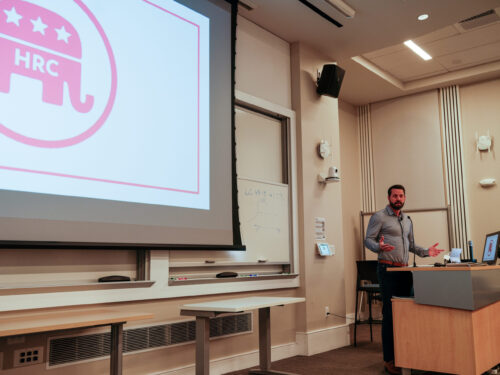Deep in the bowels of political social media, there is an ongoing debate about humor’s role in our society. Some believe that satire and ridicule are a necessary component to ensure our society has a healthy relationship with politics. If we take everything seriously and lose the ability to laugh, we are just pushing our world closer and closer to dystopia. The argument against that idea is that there are some things that we should absolutely take seriously, and satirical media like The Onion, The Babylon Bee, and South Park fail to do so. Seth Dillon, CEO of The Babylon Bee, delivered a speech to the Harvard Republican Club (HRC) last Tuesday that fell distinctly in the camp of the former.
The first half of Dillon’s remarks was an ardent celebration of Elon Musk’s takeover of Twitter (now X) and subsequent policy changes to the app’s terms and conditions—namely the reinstating of several banned accounts (including the Bee’s) and a massive change in how X polices and punishes individuals for the speech they use on the platform. Musk, a self-described “free speech absolutist,” has shifted X’s policies to merely label and identify problematic conduct, rather than outright ban or suspend users who harass and spread hate. This has led to an estimated 119 percent increase in hate speech against members of the LGBTQ+ community, and an overall 6 percent increase in harassment on the platform. When Disney, Apple, and IBM threatened to pull advertisements from X amidst the rise in hate speech, Musk responded simply: “go fuck yourself.”
“It’s unusual—you don’t really often see people saying no to Disney and their mountains of money,” said Dillon, lauding Musk’s retort. “It’s actually profound to see someone stand up and say they don’t care, that you can try to bully me and silence me and force me to do what you want and hold money over my head, but I’m going to stand for freedom no matter what… It was insane, and it was also inspirational.”
The second half of Dillon’s address was about humor and the integral role it has in America’s social-political landscape. Dillon argues a few core principles of humor. First, “humor undercuts bad ideas.” The argument here is that when presented with utter ridiculousness, regardless of what side of the political aisle you are on, the appropriate response should be to “throw back your head and laugh.” According to Dillon, “you can’t reason with someone who’s embraced madness. That’s like trying to give medicine to a dead man. But, you can ridicule those bad ideas and show the world just how foolish they are. I think mockery of this kind is a moral imperative for the obvious reason that bad ideas taken seriously have catastrophic consequences.”
Dillon’s other points in defense of humor all rest on the idea that humor is a unifying, truth-exposing force that can and should be used to bring the nation together, and the problem lies not in the jokes being told but in people’s attitudes around them. It is a clarion call that has been echoed by people across the political spectrum: the idea that we are all human, we are all equal, we all should probably take ourselves a little less seriously, and that our particular identity (race, gender, sexuality, religion) should fall second to that core principle.
We live in a world where “[people] go out of their way to be offended by everything…I don’t think it’s a very healthy mentality to have where you’re requiring that everyone is fair game for jokes except you,” argued Dillon. “Why should you be off limits? Are we not all at some point passengers on the ship of fools? Don’t we all deserve to be made fun of, at some point?”
When asked for his thoughts on free speech on college campuses, especially Harvard, Dillon gave a bleak outlook. “I’m not sure what the answer is to that. A lot of [free speech issues are] the culture and climate that’s cultivated here. And that’s very difficult to push back on when you don’t have the numbers.” For young conservatives at Harvard, the question is not so much about one candidate or another, but rather unifying and coming together as a group to better debate in the public square.
In a conversation about the talk, HRC President and Independent Special Projects Director, Michael Oved, said, “Republicans are the overwhelming minority on college campuses. Vocal Republicans—those who are willing to express their perspectives publicly—are even more scarce. I hope that by hearing Seth speaking, the 100+ Harvard Republicans who turned out for the event—a record number—feel more confident in their ability to express themselves freely. At its core, that is what the Harvard Republican Club is all about: empowering and equipping young Republicans with the knowledge and courage to express their political perspectives freely and respectfully.”
Seth Dillon’s remarks last week underscore how long the road is in the ongoing fight over free speech on campus and in the public square. That ideological struggle will likely come to a head this November with the 2024 presidential election. Until then, all we can do is try to find the humor.
Jordan Wasserberger ’27 (jwasserberger@college.harvard.edu) writes News for the Independent.

